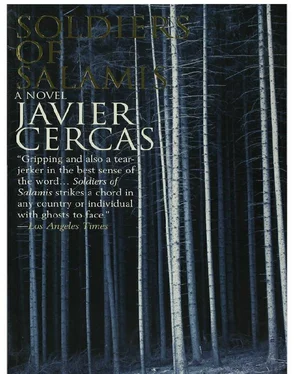'If he even exists.'
'If who even exists?'
'Who do you think? Figueras.'
The comment wiped the smile off his face; he stopped stroking his goatee.
'Don't be an idiot,' he said, focusing his astonished eyes on me, and I felt a tremendous urge to slap him, though probably it was really the novelist from Madrid I wanted to slap. 'Of course he exists.'
I restrained myself.
'Then he doesn't want to talk to me.'
Almost remorseful, almost excusing himself, Aguirre explained that Figueras was a builder or contractor (or something like that) as well as a town planning advisor (or something like that) in Cornellá de Terri, that he was, in any case, a very busy person and that undoubtedly explained why he hadn't responded to my messages; then he promised he'd speak to him. When I went back to my seat I felt awful: heart and soul I despised the novelist from Madrid, who was still holding forth.
Three days later Figueras called me. He apologized for not having done so sooner (his voice sounded slow and distant on the phone, as if the man it belonged to were very elderly, perhaps unwell), he mentioned Aguirre, then asked me if I still wanted to talk to him. I said yes; but arranging a date wasn't easy. Finally, after going through every day of the week, we decided on the following week; and after going through every bar in town (beginning with the Bistrot which Figueras didn't know), we settled on the Núria, in the plaza Poeta Marquina, very close to the station.
There I was a week later, almost a quarter of an hour before the time we'd agreed. I remember the afternoon very clearly because the following day I was going on holiday to Cancún, in Mexico, with a girlfriend I'd been seeing for a while (the third since my separation: the first was a colleague from the newspaper; the second, a girl who worked at a Pans and Company sandwich shop). Her name was Conchi and her only job I knew of was that of fortune-teller on the local television station; her stage name was Jasmine. Conchi intimidated me a little, but I suspect I've always liked women who intimidate me a little, and obviously I made sure no acquaintance would surprise me with her — not so much because I was embarrassed to be seen dating a well-known fortune-teller, as for her rather flashy appearance (bleached blonde hair, leather mini-skirt, tight tops and spike heels); and also because, why lie, Conchi was a little bit special. I remember the first time I took her back to my place. While I was wrestling with the lock on the main door, she said:
'This city's fucking pathetic'
I asked her why.
'Look,' she said and, with a grimace of utter disgust, pointed to a plaque which read: 'Avinguda Lluis Pericot. Prehistorian.' 'They could've named the street after someone who'd at least finished university, don't you think?'
Conchi loved the idea of dating a journalist (an intellectual, she'd say) and, although I'm sure she never finished reading a single one of my articles (or only the odd very short one), she always pretended to read them and in the place of honour in her living room, flanking an image of the Virgin of Guadalupe raised up on a pedestal, she had a copy of each of my books exquisitely sheathed in clear plastic. 'He's my boyfriend,' I imagined her telling her semiliterate friends, feeling very superior to them, each time one stepped into her house. When I met her, Conchi had just split up with an Ecuadorian called Dos-a-Dos González, whose name, it seemed, had been chosen in honour of a football match when the team his father had supported for his entire lifetime won their national league for the first and only time. To get over Dos-a-Dos — whom she'd met at a gym, body-building, and who in good times she affectionately called Two-All and in bad ones, Brains, Brains González — Conchi had moved to Quart, a town near by, where, almost in the middle of a forest, she'd rented a great big ramshackle house very cheaply. In a subtle but insistent way, I kept telling her to move back to the city, and my insistence was based on two lines of reasoning: one explicit and another implicit, one public and another secret. The public one was that the isolated house was a danger for her, but the day two individuals attempted to break in and Conchi, who unfortunately was home at the time, ended up chasing them through the woods throwing stones at them, I had to admit that the house was a danger for anyone who tried to break into it. The secret reason was that, since I didn't have a driver's licence, every time we went from my house to Conchi's house or from Conchi's house to my house, we had to go in Conchi's Volkswagen, a wreck so old it could well merit the attention of the prehistorian Pericot and which Conchi always drove as if she might still be in time to prevent an imminent break-in at her house, and as if all the cars moving around us were occupied by an army of delinquents. So, any car journey with my girlfriend, who needless to say loved to drive, entailed a gamble I was only willing to undertake in very exceptional circumstances; these must have occurred fairly often, at least at the beginning, because I risked my neck quite a few times back then going from her house to mine or my house to hers in her Volkswagen. Moreover, although I fear I wasn't willing to admit it, I think I liked Conchi a lot (more in any case than my colleague at the newspaper and the girl from Pans and Company; less, perhaps, than my former wife); enough, in any case, that to celebrate going out together for nine months I let her convince me to spend two weeks in Cancún, a place I imagined as truly frightful, but which (I hoped) the pleasure of being with Conchi and her amazing cheerfulness would render at least tolerable. So the evening I finally managed to arrange to meet Figueras I was already packed and impatient to be off on a trip that I sometimes (but only sometimes) considered rash.
I sat down at a table in the Núria, ordered a gin and tonic and waited. It wasn't eight o'clock yet; in front of me, on the other side of the glass walls, the terrace was full of people and beyond them every once in a while a commuter train went by on the viaduct. To my left, in the park, children accompanied by their mothers played on the swings, under the sloping shadows of the plane trees. I remember I thought of Conchi, who not long before had surprised me by saying she wasn't planning to go to her grave childless, and of my former wife, who many years before had judiciously refused my suggestion that we have a child. I thought if Conchi's declaration had also been a hint (and I now think I understand that it was), then the trip to Cancún was doubly ill-advised, because I now had no intention of ever having a child; the idea of having one with Conchi struck me as laughable. For some reason I thought of my father again, and I felt guilty again. 'Soon,' I surprised myself thinking, 'when even I don't remember him, he'll be completely dead.' At that moment, as I saw a man in his sixties come into the bar, who I thought could be Figueras, I cursed myself for having arranged two meetings with strangers, in just a few months, without previously agreeing on a way to recognize each other: I stood up, asked him if he were Jaume Figueras; he said no. I went back to my table: it was almost eight-thirty. I looked around the bar for a man on his own; then I went out to the terrace, also in vain. I wondered if Figueras had been in the bar all that time, near me and, fed up with waiting, had left; I decided that it was impossible. I didn't have his mobile number with me, so, choosing to believe that for some reason Figueras was running late and was about to arrive, I opted to wait. I ordered another gin and tonic and sat down at a table on the terrace. I nervously watched the tables around me and those inside; while I was doing so, two young Gypsies came up — a man and a woman — with an electric keyboard, a microphone and a speaker, and started playing for the customers. The man played and the woman sang. They played mostly paso dobles: I remember very well because Conchi loved paso dobles so much that she'd tried unsuccessfully to get me to sign up for a course to learn how to dance them, and especially because it was the first time in my life I heard the lyrics to 'Sighing for Spain', a very famous paso doble I didn't even know had lyrics:
Читать дальше












